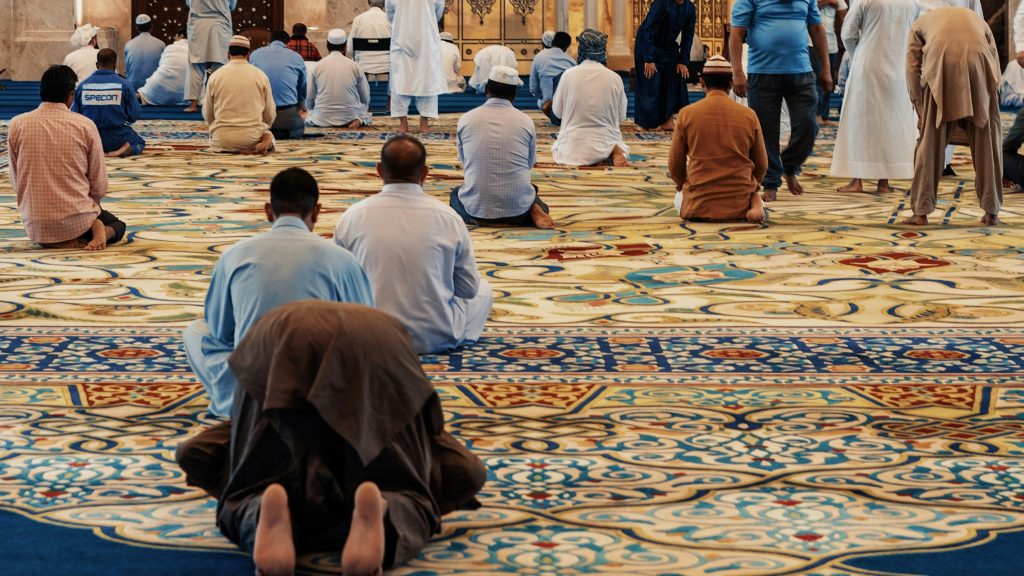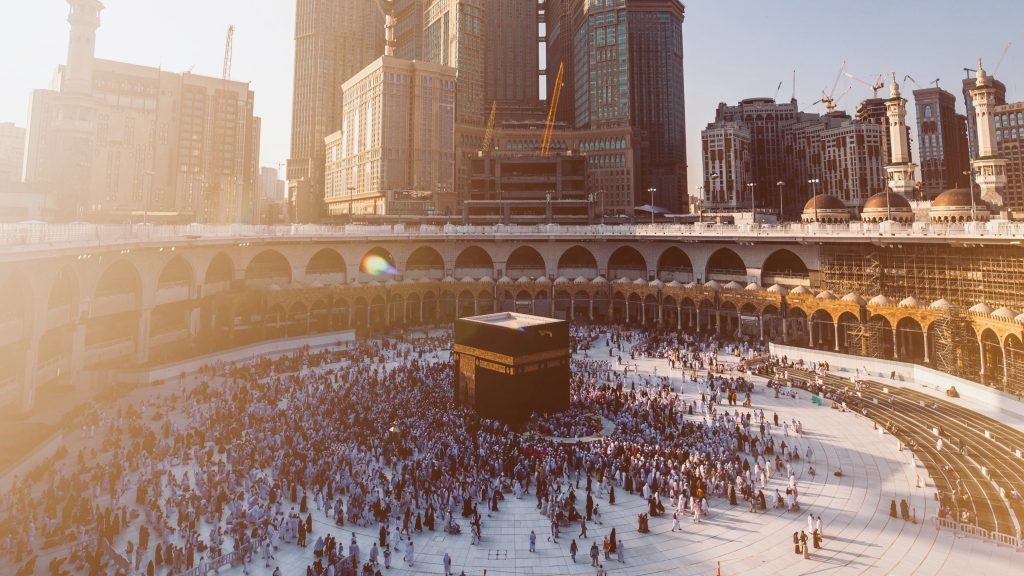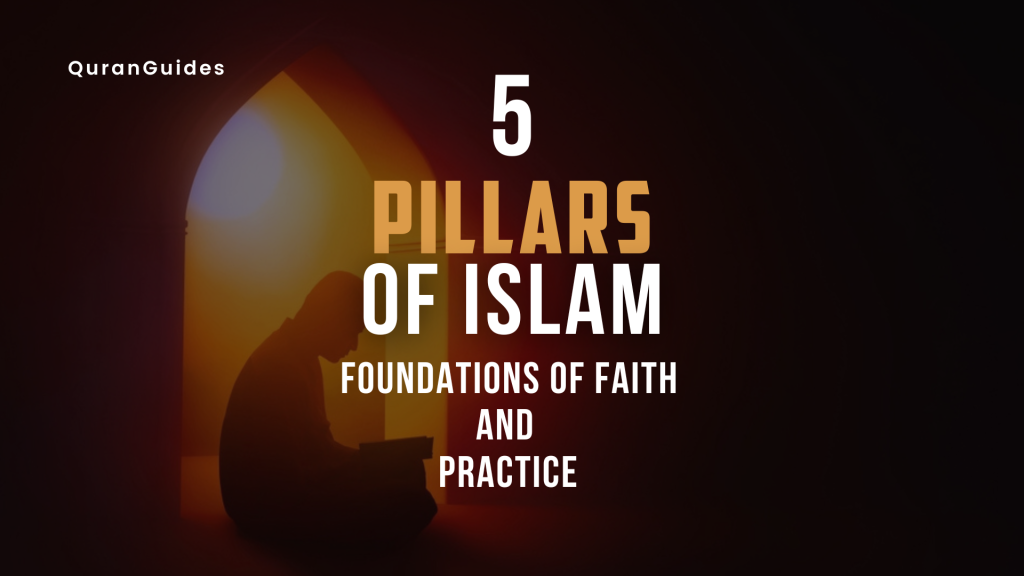“The Five Pillars of Islam form the bedrock of the Muslim religion, imparting a framework for spiritual connection and righteous living. In this article, we’ll explore each pillar’s importance and the Five Pillars of Islam in Order, delving into the essential principles that manual the lives of thousands and thousands of Muslims global.”
What are the five pillars of Islam?
The Five Pillars of Islam are:
- Shahada (Declaration of Faith): Bearing witness that there is no god but Allah, and Muhammad is His messenger.
- Salah (Prayer): Observing the ritual prayers five times a day facing the Kaaba in Mecca.
- Zakat (Charity): Giving alms or charitable donations to support those in need and promote social justice.
- Sawm (Fasting during Ramadan): Abstaining from food, drink, and other physical needs during the daylight hours throughout the holy month of Ramadan.
- Hajj (Pilgrimage to Mecca): Undertaking a pilgrimage to the holy city of Mecca at least once in a lifetime, if financially and physically able.
Pillars of Islam ?
Shahada (Declaration of Faith):

The Shahada is the fundamental assertion of the Islamic creed, bearing witness to the oneness of God (Allah) and acknowledging Muhammad as His messenger. Uttering the Shahada is the first step in embracing Islam, signifying someone’s reputation of the important tenet of monotheism.
Salah (Prayer):

It involves offering prayers five times a day, facing the sacred Kaaba in Mecca. These prayers, referred to as Salat, establish a direct and profound connection between the worshiper and Allah. The act of Salah serves as a beautiful reminder of mindfulness, gratitude, and spiritual discipline throughout the day.
Zakat (Charity):

Zakat embodies the idea of giving to those in need and promoting social justice. It is a fundamental obligation for Muslims to contribute a portion of their wealth, ensuring that resources are distributed equitably within the community. This principle underscores the significance of empathy, generosity, and recognizing our responsibility towards the less fortunate.
Sawm (Fasting during Ramadan):

Sawm, a practice observed during the holy month of Ramadan, entails refraining from food, drink, and other physical necessities from sunrise to sunset. It serves as a testament to self-restraint and self-mastery while also serving as a method of spiritual cleansing. By fasting, individuals not only demonstrate their ability to control their desires but also develop a deeper understanding of the plight of those who are hungry. Additionally, it fosters an increased awareness of one’s own actions and intentions, promoting a sense of mindfulness.
Hajj (Pilgrimage to Mecca):

Hajj is a sacred journey to the revered city of Mecca, which is an obligatory duty for Muslims who have the physical and financial means to undertake it at least once in their lifetime. This pilgrimage takes place during the Islamic month of Dhu al-Hijjah. One of the key aspects of Hajj is its emphasis on equality among Muslims. During this spiritual journey, all participants don simple white garments, serving as a symbol of unity and the universal nature of the Islamic faith.
Why are these pillars Important ?
The Five Pillars of Islam are taken into consideration crucial because they shape the inspiration of a Muslim’s religion and exercise, presenting a framework for a nicely-rounded and significant existence. Here are reasons why these pillars are critical:
- Spiritual Foundation: The pillars serve as the core principles that define the spiritual relationship between a Muslim and Allah. They guide individuals in their devotion, reinforcing the oneness of God and the importance of aligning one’s life with divine guidance.
- Community and Unity: The pillars help create a sense of community and unity among Muslims worldwide. By following the same fundamental practices, believers share a common bond that transcends geographical and cultural differences.
- Morality and Ethics: The pillars provide a moral and ethical framework for personal conduct. They encourage virtues such as honesty, generosity, compassion, and self-discipline, fostering a sense of responsibility toward oneself and others.
- Social Justice and Charity: Zakat, one of the pillars, emphasizes the importance of charity and social justice. Muslims are encouraged to share their wealth with those in need, promoting economic fairness and a sense of social responsibility.
- Discipline and Self-Control: The practice of regular prayers (Salah) and fasting (Sawm) during Ramadan instills discipline and self-control. Through these rituals, individuals learn to manage their time, desires, and behaviors, fostering personal growth and self-improvement.
- Remembrance of God: The rituals associated with the pillars serve as constant reminders of Allah and the importance of spiritual awareness in daily life. This remembrance helps Muslims stay connected to their faith amid the challenges of everyday living.
- Pilgrimage and Unity: Hajj, the pilgrimage to Mecca, symbolizes the unity of the Muslim community. It reinforces the idea that all Muslims are equal before Allah, regardless of their race, ethnicity, or social status.
- Submission to God’s Will: The term “Islam” itself means submission to the will of Allah. The Five Pillars embody this submission, emphasizing the importance of aligning one’s life with God’s guidance and surrendering to His divine will.
In summary, the Five Pillars of Islam provide a comprehensive framework that addresses religious, social, and ethical components of life, guiding Muslims of their adventure towards a purposeful and righteous life.
Also Check Our Lofi Quran Page – Click Here

